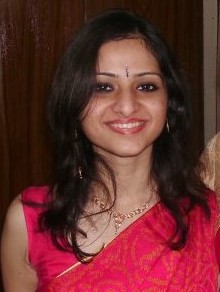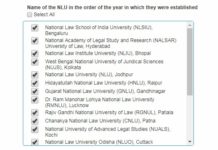[Rhodes Scholarship is known as the “world’s oldest and most prestigious international graduate scholarship”, and owes its origin to the will of the visionary Cecil J. Rhodes. Every year, only five such scholarships are given out to Indian students to pursue a degree of their choice at Oxford. Arushi Garg from NALSAR and Anupama Kumar from NLSIU are the two students from the field of law who have won this coveted Scholarship this year.
We requested Arushi Garg for an interview and she was kind enough to take time off her celebrations to answer a few questions. We congratulate her for achieving this huge feat and wish her the best of luck for all her future endeavours.]
How did it all begin? Was Law something you’ve always wanted to do?
No, by the end of high school I also contemplated studying maths, and journalism. Ultimately I chose the law because I saw immense value in using the Law to empower people.
When you joined NALSAR, what was it that you wanted to do after graduation?
I had no fixed plans. I’m still weighing all my options, but given that the field I am interested in is international criminal law, academia seems like a good idea as well. There are many reasons, but I feel that the subject isn’t discussed/promoted enough in India and we need to generate more debate surrounding it. I think if India were to support the movement, we could go a long way in ending impunity in this country.
Another incentive is the fact that the law governing the ICC is still in its nascent stages. I see a lot of scope for some very creative legal argumentation. Even today, I’d say academicians are playing a dominant role in how interpretations of the Rome Statute evolve, and contributing significantly to the development of the Law.
Did your perception of the law change after you pulled out a huge win at the Henry Dunant Memorial Moot Court Competition 2011?
The moot did have a significant impact on me. I think it brought out effectively for me the difficulty in maintaining the delicate balance between the rights of the accused on one hand, and the pressing need to provide redressal on the other. The standard of proof required for a conviction before the ICC (“beyond reasonable doubt”) is a tough standard to meet, but it is important to discharge this burden even in the case of the most egregious wrongs if we are to call ourselves a rule of law society. Actually arguing out before a mock ICC chamber taught me a lot about the practical difficulties international criminal law practitioners face.
In what way did NALSAR contribute to all that you’ve achieved?
NALSAR provides a very stimulating academic environment, and it’s been great being part of a peer group that has challenged me to push myself to meet the standards of academic excellence the University stands for. I’m also grateful for having been exposed to opportunities that other Universities don’t often provide for. My exchange semester at the University of Illinois (Urbana-Champaign) was definitely an experience that shaped the way I think.
With regard to your future plans, what’s next after you’re done with Oxford?
Thankfully, I have a long time to think about this one J But my immediate plans would involve staying on for the M. Phil, if I can.
Having been selected to be a Rhodes Scholar, how would you describe the feeling? Were you anticipating it or did it hit you a surprise?
I’m thrilled! I was trying not to think about the outcome. I won’t say that I expected it, but obviously I kept secretly hoping I would be one of the five names.
Was the selection process taxing?
I don’t know if ‘taxing’ is the right word. It did require some amount of preparation in my case (mostly mock interviews with seniors or friends) but I think the greater challenge was to just relax and not be too nervous to convince the panel that you are passionate about what you plan to do.
If one were looking to become a Rhodes Scholar, what is it that you’d suggest them to do in their five years of Law School life?
I don’t think you should reverse the order and do things because they’re likely to get you the Rhodes! I think you should do whatever interests you and see at the end if your personality type is what the Rhodes Trust is looking for.
There are thousands of kids who will either be taking CLAT now or are already in the Law School and want to achieve something this big. Your words of wisdom to them?
I would say that they should remember that achievement for the sake of achievement will only take them so far. I think it’s a good idea to take law school one step at a time, but just be sincere about anything you work on.
Lastly, any thoughts about CLATGyan?
I think it’s an excellent move towards inclusive legal education in India. You guys should keep it up!

















An
excellent write-up!!Thanks to Clat gyan for guiding all law aspirants and students for all these long!
congratulations!!!!
mam you re an inspiration to hundreds of us…….i too aspire to become like you one day and be an inspiration for others